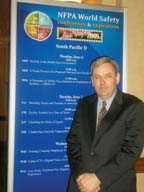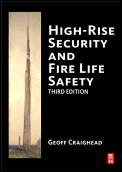
The NFPA 731 draft document was accepted by an overwhelming majority vote, Clary noted. Minority opposition came from representatives of the National Burglar & Fire Alarm Association (NBFAA) who attended the Technical Committee Report session, including president Scot Colby.
NFPA 731 covers the application, location, installation, performance, testing, and maintenance of physical security systems and their components.
The draft document of NFPA 731 was in development for about three years. It was created by an 11-member task group comprised of industry and law enforcement representatives, including members of the Central Station Alarm Association, Security Industry Association, National Electrical Contractors Asociation, Underwriters Laboratories, and State Farm Insurance.
The reason for the controversy on NFPA 731 is outlined in the NBFAA’s position paper, which can be found on www.alarm.org/infoCenter.html.
It states, in part, “The majority of equipment manufacturered by current design specifications cannot mechanically meet the requirements of this standard. The standard was composed for equipment that may be designed in the future. Any standard that is created must be designed for the use of current technology. A standard that is put into law without the technology capable of complying with the law will be catastrophic to the industry.â€
Further, the NBFAA’s position is that, “NFPA 731 does not take into consideration the small mercantile establishment that is not mandated to have a system, nor allowing them variances from this standard that would reduce cost of installing elective systems.â€
The NBFAA believes that acceptance and adoption of this standard would “increase costs significantly,†leading to many small businesses choosing not to have a security system installed, which in turn would adversely affect their vulnerability to crime. It also would affect the potential business brought to electronic security companies, the NBFAA said.
A copy of NFPA 731 may be downloaded from the NFPA web site at www.nfpa.org, in the Codes and Standards section.

